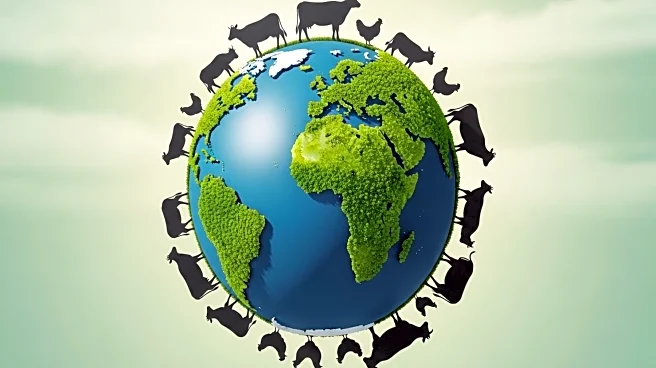What's Happening?
The Food and Agriculture Organization of the United Nations (FAO) is hosting its second Global Conference on Sustainable Livestock Transformation at its headquarters in Rome. The conference, which began on September 29, focuses on the vital role of livestock in global food security and economic stability. Livestock supports the livelihoods of approximately 1.3 billion people worldwide and contributes 40 percent of the world's agricultural GDP. The conference aims to shift from dialogue to action, emphasizing the adoption of sustainable practices in livestock systems. FAO Director-General Qu Dongyu highlighted the importance of collaboration among diverse stakeholders to achieve sustainable transformation. The event features plenary discussions, expert panels, and thematic forums addressing climate change mitigation, low-emission livestock systems, and animal health and welfare.
Why It's Important?
The conference underscores the significance of livestock in providing food security and economic resilience, particularly in low- and middle-income countries. Livestock products, such as milk, eggs, and meat, are essential components of balanced diets, contributing to global nutrition. The sector also offers employment opportunities, especially for youth and women, and acts as a financial safety net during economic shocks. The conference's focus on sustainable practices is crucial in addressing environmental impacts, public health risks, and animal welfare concerns associated with livestock production. By fostering collaboration and innovation, the conference aims to transform agrifood systems, ensuring better production, nutrition, environment, and life for all.
What's Next?
The conference will continue until October 1, with more than 1,000 stakeholders participating. FAO plans to launch the Global Challenge Programme for Transboundary Animal Diseases to protect animal health and strengthen livestock production. The organization will also support countries in implementing One Health in agrifood systems, addressing zoonotic diseases, and tackling antimicrobial resistance. FAO's initiatives include the Global Strategy for the Prevention and Control of High Pathogenicity Avian Influenza and efforts to eradicate Peste des Petits Ruminants by 2030. These actions aim to improve lives, protect the environment, and build resilience globally.
Beyond the Headlines
The conference highlights the ethical and environmental dimensions of livestock production, emphasizing the need for humane and sustainable practices. It showcases examples of farms converting manure into clean energy and repurposing by-products into new materials. The event also stresses the importance of digital technologies and scientific advances in creating sustainable livestock systems. By focusing on practical solutions, the conference aims to drive real-world change, improving livelihoods and protecting ecosystems.











